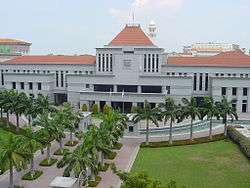Prevention of Human Trafficking Act 2015
The Prevention of Human Trafficking Act 2015 (PHTA) is a statute of the Parliament of Singapore that criminalizes Trafficking-In-Persons (TIP) especially vulnerable individuals. The law is designed specifically to make acts of knowingly receiving payment in connection with the exploitation of a trafficked victim a criminal offence.
| Prevention of Human Trafficking Act 2014 (or 2015) | |
|---|---|
 | |
| Parliament of Singapore | |
Long title
| |
| Enacted by | Parliament of Singapore |
| Enacted | 3 November 2014 |
| Assented to | 12 December 2014 |
| Commenced | 1 March 2015 |
| Status: In force | |
Overview
The PHTA is an Act to deter trafficking-in-persons and supports the rehabilitation of trafficked victims, especially vulnerable individuals. The PHTA firstly provides enforcement of severe penalties that criminalizes any individual that receives monetary compensation that arises from the exploitation of a victim that is trafficked, especially women and children.[1] The PHTA also caters for the well-being of trafficked victims and encourages the reporting of trafficking or suspected trafficking activity.[2]
Uses of the Act
With the launch of the Integrated Resorts of Singapore, vice activities are taking place within the red-light districts of Geylang and even happening outside of the red-light districts. The PHTA caters for law enforcement agencies in going after syndicated crimes, keeping vice syndicates not immune from the law if they do not apply for a licence.[3] The launch of the PHTA also saw the formation of Project X, a community-based organisation with programmes for sex workers[4] that recorded more than 50 reports of abuse where consenting sex workers may be trafficked.[5]
Within a year of the Act's commencement, a final-year student Muhammad Khairulanwar Rohmat of the Singapore Institute of Management (SIM) was found guilty of four charges of recruiting a child for sexual exploitation, receiving payment from this exploitation, and sexual penetration of a minor[6] alongside 14 charges that also were taken into consideration during sentencing.[7] Of the charges, five of Khairulanwar's charges are for living on the earnings of prostitutes.[8]
As a consequence of this Act, by 2016, the Government of Singapore also ratified the United Nations Protocol to Prevent, Suppress and Punish Trafficking in Persons, Especially Women and Children,[9] known as the Asean Convention against Trafficking in Persons, Especially Women and Children (ACTIP), at the 27th ASEAN Summit.[10]
See also
- Christopher de Souza
- K Shanmugam
References
- Kok, Xing Hui. "Singapore accedes to UN protocol to prevent and combat human trafficking". Straits Times. Retrieved 20 February 2016.
- "Prevention of Human Trafficking Act to Take Effect from 1 March 2015". Ministry of Home Affairs. Singapore Inter-Agency Taskforce on Trafficking-in-Persons. Retrieved 20 February 2016.
- "Second Reading of the Prevention of Human Trafficking Bill - Speech by Mr Masagos Zulkifli, Senior Minister of State for Home Affairs and Foreign Affairs". Ministry of Home Affairs. Government of Singapore. Retrieved 20 February 2016.
- "ProjectX". More Than Just Condoms. Sunshine Initiative (Singapore). Retrieved 20 February 2016.
- Ho, Vanessa. "Exercise prudence to protect potential human trafficking victims". Today. Retrieved 20 February 2016.
- Ng, Kelly. "First man to be charged under Prevention of Human Trafficking Act". Today. Retrieved 20 February 2016.
- Siau, Ming En. "Student pimp first to be convicted under Prevention of Human Trafficking Act". Today. Retrieved 20 February 2016.
- Lim, Yvonne. "18 charges for first man arrested under human trafficking Act". Today. Retrieved 20 February 2016.
- Kok, Xing Hui. "S'pore accedes to trafficking protocol". Straits Times. Retrieved 20 February 2016.
- Koh, Leslie (26 January 2016). "Singapore ratifies Asean Convention against Trafficking in Persons, Especially Women and Children". Straits Times. Retrieved 20 February 2016.
